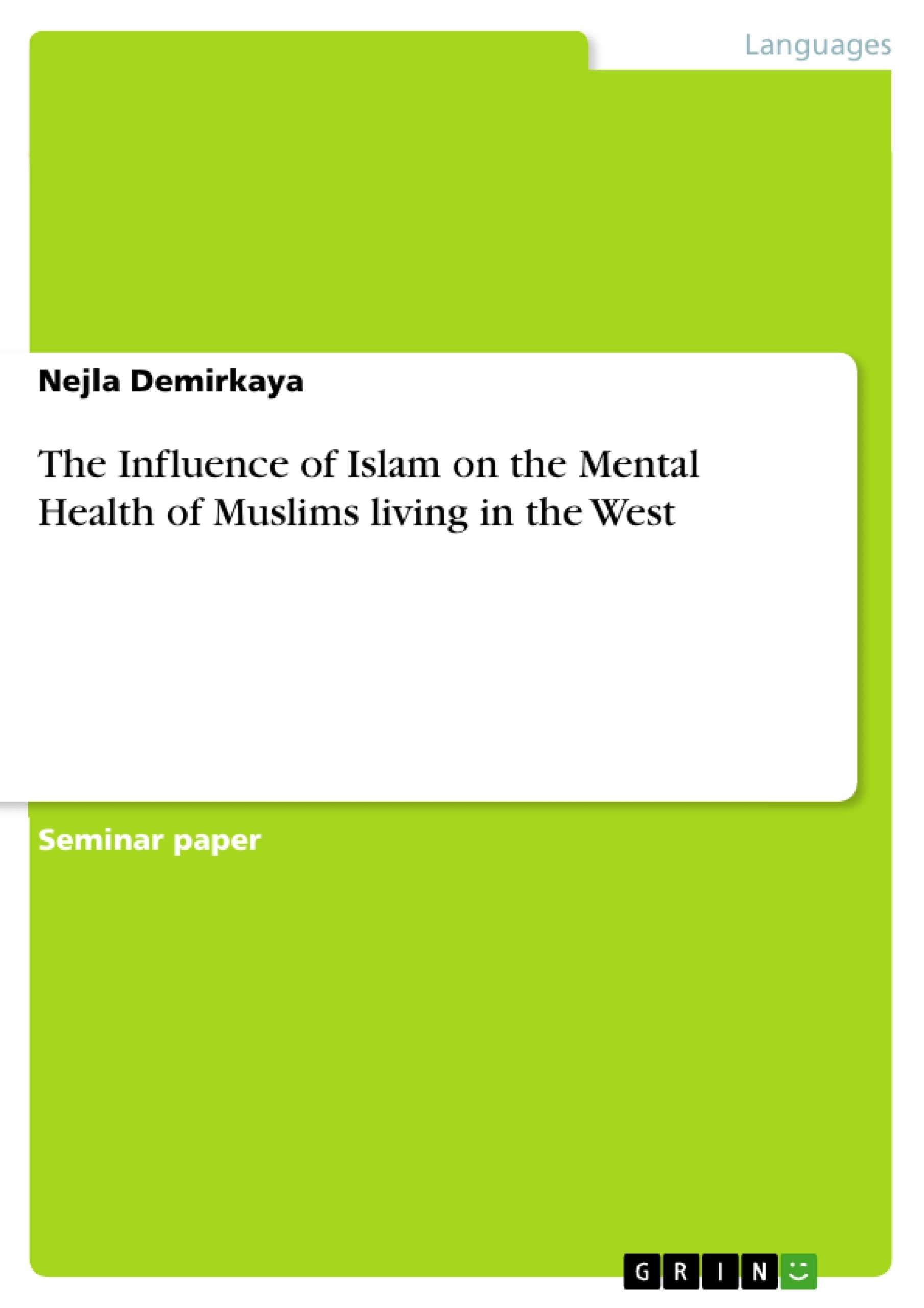For the past decade, the Islamic faith, especially when represented by minority communities living in Western countries, has repeatedly been the subject of heated debate in the political and the public sphere. Its followers are consequently confronted with the predicament of living in accordance to the prescriptions of their faith and being compelled to justify it. In this regard, Islamic adherence could very well be assessed as quite a burden. However, religion and spirituality have long since been recognised as beneficial to the coping process in times of emotional and psychological distress, albeit predominantly in the Christian context. Acknowledging the special situation of Muslims in Western countries , this paper aims to provide an analysis of the situation of Muslims with mental health issues living in a non-Islamic society, namely the multicultural, secular societies of the UK and the USA. It furthermore seeks to establish in what ways the Islamic religion influences the patients‘ outlook on themselves and their choices of treatment. It presumes that anti-Muslim bias, unfortunately widespread in the West, has its impact on its victims‘ psychological well-being. Not merely belonging to a minority group, but one that is continuously hated against, might prove to be a factor that negatively affects the psychological health of Muslims.
Numerous questions are inherently connected with this approach: How does affiliation to Islam influence adherence to treatment regimes? Do Muslims in the West generally oppose biomedicine? Or are biomedical and traditional treatment complementary in the minds of the sick? Does Islam promote behaviour beneficial to mental health or does it rather constitute a risk factor? Does the simple fact of following Islam present Muslims living in the West with conditions harmful to their mental health?
Table of Contents
- Introduction
- Mental illness in Islamic and Muslim tradition
- Mental health stressors
- Muslims in the US
- Statistics and demographics
- Coping strategies and health care seeking behaviour
- Muslims in the UK
- Statistics and demographics
- Coping strategies and health care seeking behaviour
- Conclusion
Objectives and Key Themes
This paper aims to analyze the mental health situation of Muslims living in the UK and USA, focusing on how Islam influences their outlook and treatment choices. The paper explores the impact of anti-Muslim bias and its effect on psychological well-being, considering both the challenges and potential benefits of Islamic beliefs in relation to mental health.
- Influence of Islam on mental health of Muslims in Western countries
- Impact of anti-Muslim bias on psychological well-being
- Exploration of Islamic perspectives on mental illness and treatment
- Analysis of coping strategies and health care seeking behaviour
- Comparison of the situation in the UK and the USA
Chapter Summaries
The introduction highlights the growing debate surrounding Islam in Western societies and explores the challenges faced by Muslims in balancing their faith with societal expectations. It introduces the focus on the mental health situation of Muslims in the UK and USA and emphasizes the potential influence of anti-Muslim bias.
Chapter 2 delves into the Islamic and Muslim concepts of health, particularly mental health, providing an overview of the religious framework. It discusses the perception of mental illness as a consequence of spiritual deviation and the associated stigma within Muslim communities. Additionally, it explores the concept of illness as a form of divine mercy for spiritual growth and purification.
Chapter 3 examines specific mental health stressors faced by Muslims living in Western societies, speculating on the challenges posed by a potentially hostile environment. The chapter lays the groundwork for subsequent chapters by providing an initial impression of the difficulties encountered by Muslims.
Chapter 4 focuses on the situation of American Muslims, beginning with an overview of demographics, religiousness, and prevalence of mental illness. The chapter further investigates the mental health care seeking behavior of American Muslims, drawing connections to the previous discussions on Islamic perspectives and coping strategies.
Chapter 5 mirrors the structure of Chapter 4, analyzing the situation of British Muslims. It examines demographics, religiousness, and mental illness prevalence, followed by an in-depth exploration of their health care seeking behavior in the UK context.
Keywords
Islam, mental health, Muslims, Western countries, anti-Muslim bias, coping strategies, health care seeking behavior, Islamic perspectives, stigma, religious framework, demographics, prevalence of mental illness, UK, USA.
Frequently Asked Questions
How does Islam influence the perception of mental health?
In Islamic tradition, mental illness can be seen as a spiritual trial or a consequence of spiritual deviation, but it is also often viewed as a form of divine mercy for spiritual growth.
What are the main stressors for Muslims living in the West?
Key stressors include anti-Muslim bias, the pressure to justify their faith in secular societies, and the challenge of belonging to a marginalized minority group.
Do Muslims in the West generally oppose biomedicine for mental health?
The paper investigates whether Muslims prefer traditional treatments or if they view biomedical and traditional approaches as complementary in managing psychological distress.
Is there a stigma surrounding mental illness in Muslim communities?
Yes, the paper discusses how religious frameworks and societal expectations can contribute to stigma, potentially affecting health care seeking behavior.
Are there differences between Muslims in the UK and the USA?
The study compares demographics, prevalence of mental illness, and coping strategies between these two multicultural societies to identify specific regional challenges.
- Quote paper
- Nejla Demirkaya (Author), 2014, The Influence of Islam on the Mental Health of Muslims living in the West, Munich, GRIN Verlag, https://www.grin.com/document/293786



